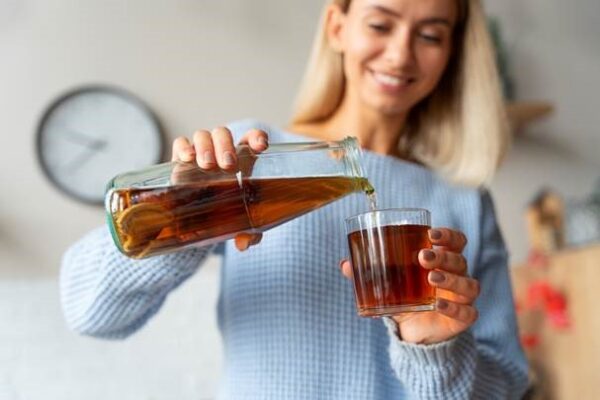The global bottled tea market refers to packaged ready-to-drink teas distributed through retail channels worldwide. Key product categories include black tea, green tea, herbal tea, matcha tea and others like oolong and white tea. The market caters to rising on-the-go consumption demands for convenient and healthy beverage options.
The bottled tea market is anticipated to grow at a Compound Annual Growth Rate (CAGR) of 4.5% from 2023 to 2033. With a valuation of US$ 50 billion in 2023, it is projected to achieve a market size of US$ 78 billion by the conclusion of 2033.
Bottled tea allows consumers to enjoy favorite tea preparations without the hassle of steeping leaves. Innovative combinations of tea extracts, fruits, herbs, vitamins and supplements within attractive packaging create a premium perception that supports higher price points for manufacturers versus other mass beverage categories.
Urban professionals are the primary target demographic owing to on-the-go lifestyles and rising health consciousness. Marketers thus emphasis functional benefits around antioxidants, vitamins, and natural energy alongside great taste. Distribution through professional workplaces and fitness centers builds consumption occasion awareness aligned to white-collar wellness trends.
Rising competition from alternative beverages including energy drinks, coffees, health drinks and even water compel bottled tea brands to launch innovative offerings aligned to emerging consumer priorities around functional ingredients, sugar reduction, unique flavors, organic positionings, and sustainable packaging.
Many incumbents now focus on developing specialist products like kombucha-infused teas targeting niche health segments. Premiumization also remains a key strategy, seen in high minimum order volumes that enhance the category’s aspirational status. International expansion to realize growth opportunities within markets like Western Europe and Latin America also features prominently.
Mergers & acquisitions similarly allow smaller tea brands to leverage the distribution might of bigger beverage corporations. Independent brands in turn help conglomerates augment their innovation pipelines and brand portfolios.
The overall expansion of the bottled tea market can be attributed to several factors:
- Growing demand for specialty teas and their increased availability.
- Preferences of health-conscious consumers for nutritious tea beverages.
- Millennials’ expanding taste preferences for a variety of ready-to-drink bottled tea flavors.
- Widening accessibility of bottled tea through diverse sales channels.
Bottled Tea Market Trends
Notable trends shaping bottled tea innovation and marketing include:
- Unique fruit flavor infusions and botanical combinations
- Kombucha tea gaining traction for gut health benefits
- Organic and sustainable ingredient sourcing
- Attractive and functional packaging design
- Direct-to-consumer models building brand loyalty
- Distribution via gyms, workplaces and airlines
- Positioning as superior hydration and as an energy drink alternative
- Targeting men through active lifestyle associations
Bottled Tea Market Opportunities
Substantial growth runway remains for bottled tea to convert at-home loose leaf tea drinkers in developed markets like Western Europe and North America along with further penetration in emerging regions. Kids also represent an underexplored target group in most regions.
More natural energy drink replacement represents a promising use case too. Brands able to substantiate unique functional benefits and better communicate hydration qualities relative to water stand to gain. There are also untapped events distribution possibilities around venues like music festivals and marathons where bottled tea can quench thirst and provide energizing lift.
Competitive Landscape
In the competitive landscape, leading companies are striving to enhance their market presence through the incorporation of innovative ingredients and flavor combinations, while maintaining stringent quality control measures. Key manufacturers in the bottled tea sector are implementing strategies such as introducing new developments, elevating product standards, and launching products in compliance with safety regulations to minimize environmental impact. Their focus extends to factors such as authenticity, packaging, pricing trends, and the optimization of supply chain management.
For example:
- Tiesta Tea, a Chicago-based loose-leaf tea company, introduced a novel line of functional cold-brew bottled tea available in selected U.S. grocery stores.
- Buddha Teas, a California-based brand, expanded its reach into Latin America, specifically Mexico, with offerings including bottled tea and beverages, cannabidiol blends, and ready-to-drink matcha beverages.
- Stok, a brand owned by DanonWave, unveiled a new series of cold brew beverages, featuring Stok Yerba Mate Cold Brew Teas, representing a range of ready-to-drink bottled tea options.
- Arcadia Beverage introduced Zumora, a fresh clean-label beverage line that includes bottled tea among its offerings.
Key companies in Bottled Tea Market: Argo Tea, OISHI GROUP, Suntory Products Ltd., Tiesta Tea, Arizona Beverage Company, Monster Beverage Corporation, PepsiCo Inc., Arcadia Beverage
These insights are based on a report on Bottled Tea Market by Fact.MR








